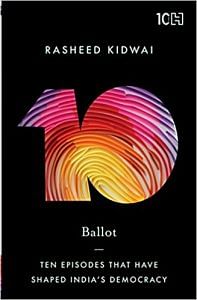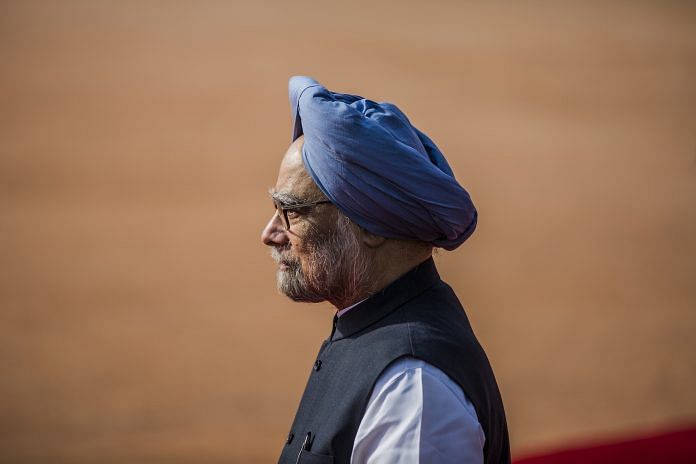In this excerpt from ‘Ballot: Ten Episodes that Have Shaped India’s Democracy’ author Rasheed Kidwai writes about the various battles in the UPA government.
When Manmohan Singh was elected as the leader of the CPP, the CPP Constitution was amended to create the post of a chairperson more powerful than the CPP leader. Sonia Gandhi was made chairperson of the UPA, and the head of a National Advisory Council (NAC) set up to act as a driver for policy-making in government. The advisory council was packed with socialist–leftist thinkers and non-government leaders (some with plenty of grass-roots experience) who often had scant regard for the political system. Most NAC members enjoyed the status of cabinet ministers without any accountability. The salary and perks of the 10 NAC members and their 35 staffers were decided by the Prime Minister’s Office (PMO). According to a former minister in the PMO, who spoke off-the record, Singh dreaded visits from members of the NAC. One source recalled that members of the NAC would even, in defiance of protocol, address the prime minister by his first name.
The NAC was credited with pushing the National Rural Employment Guarantee Act (NREGA) later renamed the Mahatma Gandhi National Rural Employment Guarantee Act (MNREGA), the Right to Information Act (RTI), the domestic violence bill, the food security bill, the nutrition policy for children, the tribal resettlement policy, the forest rights act and the communal violence bill, but in passing these bills it continually clashed with the bureaucracy and the political establishment. The Common Minimum Programme (CMP) that was worked out hurriedly in 2004 had turned into a sacred book for the UPA regime. It was packed with populist measures that seemed to have left little room for infrastructure development and economic growth. Many in the ambitious middle class began to view the UPA government as one that did not care for them and members of the NAC were criticised for not knowing how to balance their social aims with the reality of the country’s finances. The BJP in particular sharpened its attack on the NAC as it felt the body gave Sonia the status of a ‘super PM’.
Sonia’s reliance on the NAC highlighted the absence of the Congress party’s intellectual capability to influence government policy and bureaucracy. Traditionally, in a parliamentary democracy, party leaders have their ear to the ground while legislators remain sensitive to their constituents’ problems. The NAC was neither here nor there. Throughout the ten years of the UPA’s rule, 24 Akbar Road, the Congress headquarters in Delhi, contributed little in terms of either generating new ideas or sending any concrete proposal from the party to the government. Some old-timers even wondered if the Congress leadership had assumed a negative role with its functionaries acting to kill or blunt any fresh initiative rather than utilising the talent available with them.
Meanwhile, in the government, Singh’s senior ministers fought bitterly among themselves, even as allegations of high-level corruption relating to the 2G spectrum, coal bloc allocations and the Commonwealth Games were raised by both the far right and those seeking transparency in public life. The various acts of omission and commission in the alleged coal scam were the most glaring.
Similarly, environmental clearances were handled tardily. There was open talk of industrialists being forced to pay a tax of sorts. The minister in charge, Jayanthi Natrajan, became so controversial that Narendra Modi openly talked about a ‘Jayanthi tax’ – an allegation that went virtually uncontested.
In another instance, a minister of state refused to clear a coal project that the prime minister was personally keen to launch. Repeated attempts were made by the PMO to make the minister see reason, but he did not budge. Often, the minister, now deceased, was heard flaunting his proximity to a senior AICC functionary and claiming that he could not be ‘harmed’. This led to Singh’s detractors privately describing the prime minister as a ‘super-cabinet secretary’ who had the freedom to address issues ranging from administrative reforms to the pension bill but not of actually following through.
The environment ministry’s functioning during the UPA’s second term upset even Congress chief ministers. A particular chief minister shared with this author how a noted industrialist offered to get the state’s project cleared. ‘I felt small,’ the chief minister said on the condition of anonymity, ‘that a business house had powers to intervene and get things done in a matter that was between the centre and a state government run by the same political party.’
 Excerpted with permission from ‘Ballot: Ten Episodes that Have Shaped India’s Democracy’ by Rasheed Kidwai (published by Hachette India)
Excerpted with permission from ‘Ballot: Ten Episodes that Have Shaped India’s Democracy’ by Rasheed Kidwai (published by Hachette India)




Well, they are distributing environment clearances like cheap free pamphlets now. So, go ahead celebrate all the mining in protected forest zones and development projects with zero compensation. The environment is yours to destroy permanently because you won a Lok Sabha election for five years. And very polite, calling Manmohan Singh a super cabinet secretary. To you it might sound like a clever insult you’ve conjured, but it’s just a low level lame joke. I wish Print followed journalism sometimes, and got the people they routinely slander here to give their side of the story. At least, tried. Or is it just a forum for resentful blokes to lash out, now that another government is in power? I can betcha super cabinet secretary did much more solid work than his Royal highness, first prime minister of India in 70 years, Modi – lacks in ideas, lacks in ethics, lacks in democracy. What is wrong if a junior Minister withheld clearances going against PM Singh? India is not some monarchy with the whip and writ of an autocrat. Or atleast wasn’t in those 10 years. But make an effort to interview Jayanthi Natraj some day. Takes more journalistic chops. But do it. Or you are nothing more than Twitter with 28000 characters.
The limitations of being a nominated PM, denied even the courtesy of election to the Lok Sabha from a safe seat, were known to all concerned. However, within those constraints, Dr Singh could and should have done much more, especially on economic reforms, his original fame to claim. Those were high growth years, a conducive environment for unshackling the economy, with sufficient tax buoyancy to sate some of the demands of the NAC. Even on coal and spectrum, Dr Singh, assisted by some senior colleagues like Shri Pranab Mukherjee, could have sensitised the party president, whose family had been scarred by Bofors, to the dangers that lay ahead. Over the course of a decade, Dr Singh could have carved out a larger space for himself , using the institution of the core committee. Towards the close, the comfort of his chair may have forced him to accept many things he should not have.